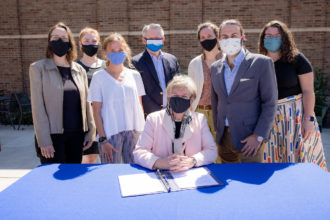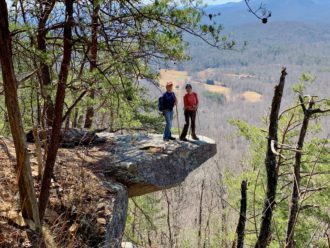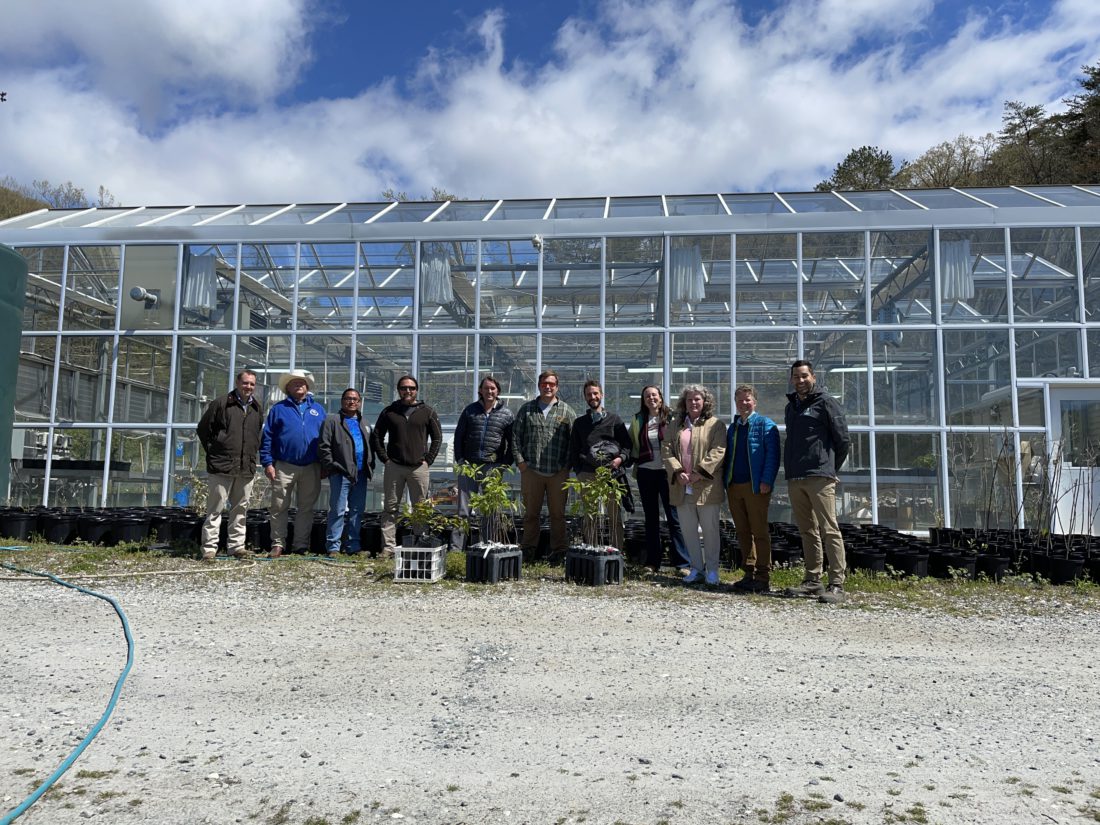The American chestnut, once a key component of the forests that Western North Carolina’s Indigenous Cherokee call home, has all but disappeared from the landscape over the past century, a casualty of the chestnut blight fungus. Now, a new agreement between The American Chestnut Foundation and the Eastern Band of Cherokee Indians aims to bring the tree back to native lands.
The Asheville-based nonprofit TACF has spent decades developing new chestnut varieties that can resist the blight through both traditional breeding and genetic modification. Under the memorandum of understanding with the EBCI, tribal members would establish a demonstration orchard of these disease-resistant trees and use them to cross-pollinate local wild chestnuts.
Eventually, the Cherokee aim to repopulate their entire Qualla Boundary territory using chestnut seeds grown in tribal orchards. “I hope that one day in the future — 200, 500, 1,000 years from now — those generations can stand next to a 6- or 8-foot diameter chestnut tree in our mountains and be able to trace the story of that tree back to today,” said Joey Owle, the EBCI’s secretary of agriculture and natural resources, in a press release announcing the agreement.
The memorandum’s timeline indicates that the demonstration orchard might be planted within the next two years, while seed production orchards might come online within seven years. Repopulating the forest, however, “may take a century or longer.”
UNCA commits to carbon neutrality by 2050

After extensive student activism, UNC Asheville has pledged to become entirely carbon neutral by 2050. That commitment places the school among just 10% of American colleges and universities, according to a press release announcing the move.
“We had overwhelming student support for the signing of the Carbon Commitment. Petitions were signed by several student organizations, such as Asheville Students for a Healthy Environment, UNC Asheville Divest Coalition, Student Environmental Center and the Student Government Association,” said John Pierce, UNCA’s vice chancellor for budget and finance. “Not only does the Carbon Commitment align with our students’ values, but also our institutional core values.”
Initial steps toward the goal include the creation of a climate action plan, a greenhouse gas emissions inventory and greater discussion of climate change in the school’s curriculum. UNCA will also conduct an annual progress evaluation and identify immediate opportunities for carbon reductions.
In 2019, UNCA became the first school in the UNC system to divert part of its endowment from investments with ties to fossil fuels. That divestment involved roughly 10% of the university’s $50 million in assets.
Strive Beyond marks 30th anniversary
A regional effort to encourage car-free transportation celebrates 30 years this month. Strive Beyond (formerly Strive Not to Drive), organized by the Land of Sky Regional Council, French Broad River Metropolitan Planning Organization and WNC nonprofit partners, offers a full week of events Monday-Friday, May 17-21.
Before Strive Beyond Week proper, AARP Mountain Region and Asheville-based conservation nonprofit MountainTrue are hosting a free webinar about local alternative modes of transportation at 12:30 p.m. Thursday, May 13. Topics include transit, greenways and complete streets; more information and registration available at avl.mx/9cs.
The full schedule of events is available at StriveBeyond.org. Participants can also sign the online Strive Not to Drive Pledge, committing to go without a car for the week, at avl.mx/9ct.
Save the date
- After months of work by artist Matt Willey, downtown Hendersonville’s Bee and Pollinator Mural will be dedicated in a 10:30 a.m. ceremony on Thursday, May 13. The artwork, painted on the side of the Hands On! Children’s Museum and accompanied by a nearby pollinator garden, is meant to inspire residents to sustain healthy local ecosystems.
- The Creation Care Alliance’s summer Eco-Grief Circles kick off Thursday, May 13. The seven-week online program aims to honestly address sorrow and suffering tied to ecological crises with support from counselors, pastors and environmental advocates. More information and registration available at avl.mx/9cd.
- As part of a four-episode series on the local impacts of climate change, MountainTrue hosts a webinar on adaptation and mitigation strategies for the Blue Ridge Mountains at 11 a.m. Thursday, May 20. Speakers include the organization’s ecologist, Bob Gale, and field biologist, Josh Kelly. More information and registration available at avl.mx/9cb.
- Registration is now open for the Foothills Conservancy of North Carolina’s summer camp, Our Big Backyard. The five-day sessions, which run Monday-Friday, July 12-16 or 26-30, feature a mix of virtual and in-person activities designed to help children ages 6-12 explore the natural world. More information available at avl.mx/9cc; all campers must be registered by 5 p.m. Thursday, May 20, by emailing selliott@foothillsconservancy.org.
News to use
-

OUT AND ABOUT: Conserving Carolina’s recently opened Youngs Mountain Trail provides striking views of the Hickory Nut Gorge from several rock outcroppings. Photo courtesy of Conserving Carolina Hendersonville-based nonprofit Conserving Carolina recently opened the 2.1-mile Youngs Mountain Trail in the Hickory Nut Gorge. The steep, out-and-back path offers views of Chimney Rock State Park and Buffalo Creek Park, along with other area mountains. Parking at the trailhead is limited, and hikers must register for a free parking day pass at avl.mx/9ce.
- MountainTrue will resume weekly Swim Guide updates on Thursday, May 27 — just in time for Memorial Day weekend. The results for the French Broad River, available at TheSwimGuide.org, show if E. coli levels at approximately 30 popular streams and recreation areas exceed standards set by the federal Environmental Protection Agency.
- The N.C. Wildlife Resources Commission reminds WNC residents and visitors that snake sightings are likely to become more common as the weather warms. WRC staffers are also seeking reports of northern pine snakes and all rattlesnake species to help their conservation efforts. Sightings with accompanying photos can be reported by email to pinesnake@ncwildlife.org and rattlesnake@ncwildlife.org or submitted through the HerpMapper mobile app.
- Another NCWRC program, the Pisgah Center for Wildlife Education in Pisgah Forest, is seeking volunteers to fill a number of roles. Responsibilities include fishing mentors, front desk greeters and gardeners. For more information, call 828-877-4423 or email lee.sherrill@ncwildife.org or melinda.patterson@ncwildlife.org.
Community kudos
- Asheville-based nonprofit EcoForesters announced the formation of the Forest Restoration and Stewardship Fund to foster invasive species control on permanently protected lands. With support from the Community Foundation of Western North Carolina and 15 business partners, the fund will provide up to $30,000 in grants through 2021. More information and donation details available at avl.mx/9cf.
- The Foothills Conservancy of North Carolina received a grant of nearly $244,000 from the N.C. Division of Parks and Recreation to begin construction on the Wilderness Gateway State Trail. The 6.8-mile section in McDowell and Rutherford counties is the first of roughly 100 planned miles for the trail, which will stretch from the Hickory Nut Gorge State Trail in the west to the towns of Hickory and Newton in the east.
- Irene Rossell, a professor of environmental studies at UNC Asheville, received the school’s Board of Governors Award for Excellence in Teaching. A press release announcing the honor particularly noted her work with Science on the Move, a program that offers field trips and multimedia science activities to the children of local migrant farmworkers.
- A team from Asheville’s Nesbitt Discovery Academy earned first place in the community service learning project category at the NC Envirothon for its work on water quality monitoring and improvement. The students will install a stormwater wetland to help remediate the former site of an electronics manufacturing plant located on the school’s campus.
- The Friends of DuPont Forest named seven new board members: Al Beers, Amanda Fox-McGlashan, Jonas Lichty, Carolyn Morrisroe, Walter Perry, Miriam Pflug and Michael Stewart. The Hendersonville-based nonprofit supports trails and natural resource conservation at the DuPont State Recreational Forest.




Before you comment
The comments section is here to provide a platform for civil dialogue on the issues we face together as a local community. Xpress is committed to offering this platform for all voices, but when the tone of the discussion gets nasty or strays off topic, we believe many people choose not to participate. Xpress editors are determined to moderate comments to ensure a constructive interchange is maintained. All comments judged not to be in keeping with the spirit of civil discourse will be removed and repeat violators will be banned. See here for our terms of service. Thank you for being part of this effort to promote respectful discussion.